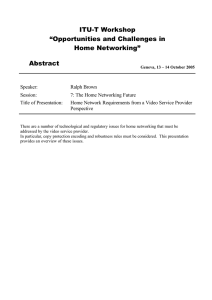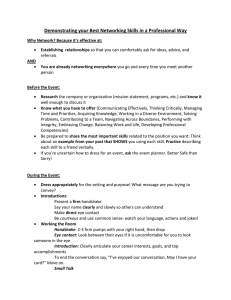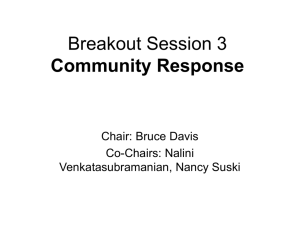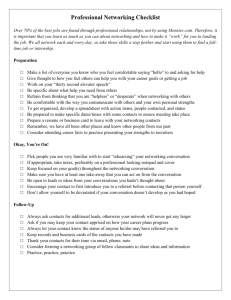NETWORKING
advertisement
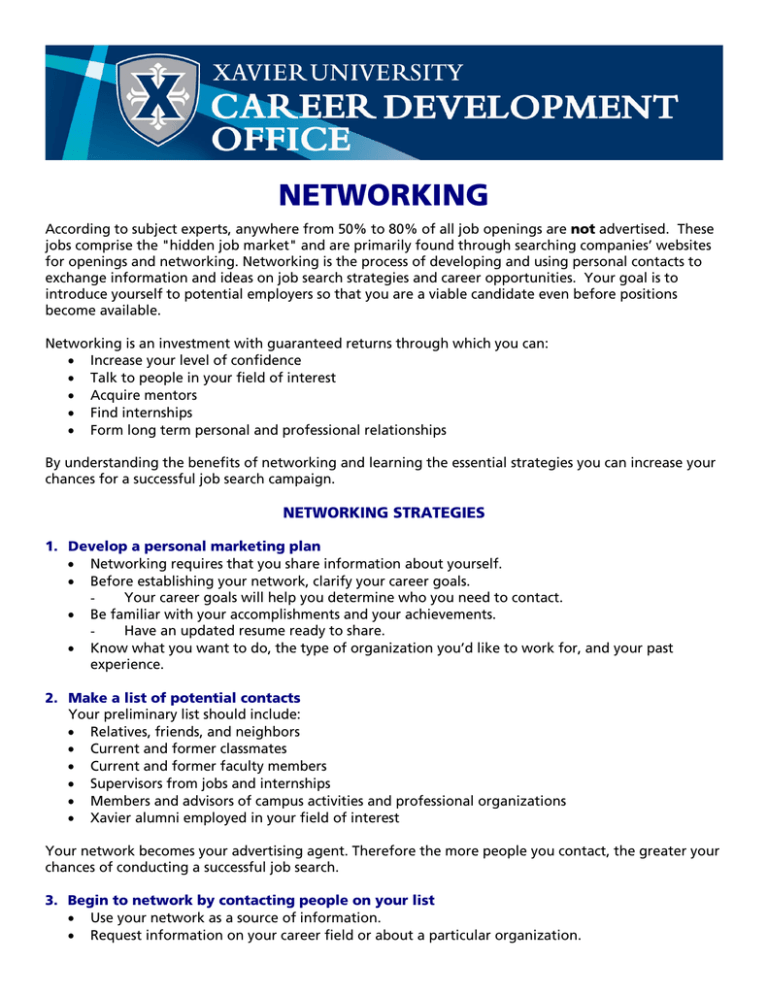
NETWORKING According to subject experts, anywhere from 50% to 80% of all job openings are not advertised. These jobs comprise the "hidden job market" and are primarily found through searching companies’ websites for openings and networking. Networking is the process of developing and using personal contacts to exchange information and ideas on job search strategies and career opportunities. Your goal is to introduce yourself to potential employers so that you are a viable candidate even before positions become available. Networking is an investment with guaranteed returns through which you can: • Increase your level of confidence • Talk to people in your field of interest • Acquire mentors • Find internships • Form long term personal and professional relationships By understanding the benefits of networking and learning the essential strategies you can increase your chances for a successful job search campaign. NETWORKING STRATEGIES 1. Develop a personal marketing plan • Networking requires that you share information about yourself. • Before establishing your network, clarify your career goals. Your career goals will help you determine who you need to contact. • Be familiar with your accomplishments and your achievements. Have an updated resume ready to share. • Know what you want to do, the type of organization you’d like to work for, and your past experience. 2. Make a list of potential contacts Your preliminary list should include: • Relatives, friends, and neighbors • Current and former classmates • Current and former faculty members • Supervisors from jobs and internships • Members and advisors of campus activities and professional organizations • Xavier alumni employed in your field of interest Your network becomes your advertising agent. Therefore the more people you contact, the greater your chances of conducting a successful job search. 3. Begin to network by contacting people on your list • Use your network as a source of information. • Request information on your career field or about a particular organization. • • • • Do not be afraid to ask questions. Most people are more than willing to discuss their career field and offer career advice. Ask the people you contact to refer you to additional contacts Refer to the Job & Internship Search Guide (located in the Career Development Office, CLC Room 530) for sample informational interviewing questions. 4. Follow up with all contacts • Do not neglect to follow-up on leads you have been given. You do not want to embarrass those who have made connections for you. • Send a thank you letter to every person you contact. Refer to the Job & Internship Search Guide for samples of thank you letters. • Update individuals in your network of the progress you have made in your job search as a result of the information and connections they have provided you. • In doing so, there will always be an active network that can benefit you both personally and professionally. • Incorporate networking into your everyday life even after you have found a job. Keep a log of information about all contacts you make and the information that they provide you. Utilize the sample networking contact sheet below to make the most of these discussions. NETWORKING CONTACT LOG Name: Phone: Email: Title: Organization: Address: City, State, Zip: Date of Contact: Referred by: Summary of Initial Contact: Follow up Plan (thank you note, etc.): Additional Referrals Provided: 1. 2. 3. Additional Notes:
